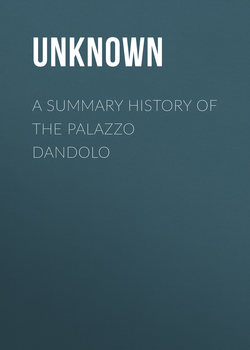Читать книгу A Summary History of the Palazzo Dandolo - Unknown - Страница 1
ОглавлениеVIEW OF THE EXTERIOR OF THE TWO PALACES WHICH FORM THE ROYAL HOTEL DANIELI
In 1805 the second floor of the Palazzo Dandolo, situated in the Calle delle Razze, and fronting on to the Riva degli Schiavoni, was bought by a certain Dal Niel, sur-named Danieli, from a member of the families of Michiel and Bernardo, into whose hands it had come, partly by inheritance and partly by marriages. The new proprietor converted it into an hotel, giving it his own name—Hotel Danieli.
Although the use to which this Palace, which once occupied so large a place in the glories of the history of Venice, has been put during the present century is very different from that for which it was built, it has always been kept most worthily, first by Danieli, then by his daughter Alfonsina, the wife of Vespasiano Muzzarelli, then by his grand-daughter, Giuseppina Roux, and last by S.S. Genovesi and Campi; so that it had the honour, which it still possesses, of being chosen by Emperors, Kings, Princes, and Ambassadors, and by great men of all countries whose artistic travels bring them to this incomparable city, so justly called the « Pearl of the Adriatic ».
To the honour of the proprietors, who have succeeded one another in this hotel, be it said that although, from time to time, certain works have been executed in this historic Palace, to adapt it to its new use as an hotel, yet not only have the staircases, the saloons and the various apartments been preserved just as they were, but the artistic beauties, and the historical souvenirs, have been carefully respected; the stuccoes and frescoes of the XVIth and XVIIth century have been spared; and the portraits and heraldic shields of the Dandolos, the Bernardos, and the Mocenigos can still be admired today in their original positions.
PANORAMAS FROM THE BALCONIES OF THE PALAZZO DANDOLO (NOW HOTEL ROYAL DANIELI)
PANORAMAS FROM THE BALCONIES OF THE PALAZZO DANDOLO (NOW HOTEL ROYAL DANIELI)
It will surely be agreeable to the travellers who come to lodge in this remarkable building to know its origin and its history. We propose to give them a rapid sketch of both; and we believe it will not be uninteresting to them to know that in the halls and chambers they inhabit, some of the most important acts of the great Venetian Republic have been discussed and decided upon; and that in this Palace besides Doges and Senators, Kings and Ambassadors, Alfred de Musset (then a fair and charming young man in delicate health) took up his abode, in 1833, and Balzac, m.me George Sand (who here wrote her novel Leone Leoni), and Victor Feuillet, who, for his magnificent romance « L'Honnêteté », drew his inspiration from Venetian subjects.
But to return to the ancient history of the Palace (now Hotel Royal Danieli) it was built in 1400, by one of the Dandolo families, but whether by that of the great Doge, Enrico Dandolo, is not quite certain. In the Chronicles of Malipiero which date from 1457 to 1500 we find the following passage « Today, the 28h August 1498, have arrived the Ambassadors of Florence, Rucellai and Vespucci; who are lodged in the Palazzo Dandolo, in the Calle delle Razze ». We should here remark that the beautiful Gothic door, in the Calle delle Razze was originally the principle entrance, and the one on the Riva degli Schiavoni has only been opened in recent years for the convenience of travellers.
We find confirmation of what has been said as to the date of the Palace, and as to the family who built it, in the Diary of Sanudo, in which he tells us that « on the 7h April 1498 the Prince of Salerno came to Venice. A most brilliant reception was given him, great festas were held in his honour, and he, and his suite of forty-four persons were lodged in the Dandolo Palace of the Calle delle Razze ».
Sanudo tells us again that « in 1499, this magnificent abode was prepared, by order of the Republic, to receive worthily the French Ambassadors ».
We could cite many other historical passages proving that this Palace had belonged to the Dandolo family, but one more, and a very interesting one, must suffice. In Sanudo's Diary we read again « On the evening of the 21 February 1531 the orator Cesareo, in the Palace Dandolo, Calle delle Razze, on the quay, gave a very great feast, with fireworks concerts, and illuminated boats, Spanish fashion, on the Canal of St. Mark's, on the occasion of the elevation of the king of Hungary and Boemia, to the dignity of a King of the Romans ».
This historic Palace passed from the Dandolos to the Gritti family, in 1536, by a deed of sale; and it is not without interest to note that to distinguish it from others of the same name, it is called in the deed, « that Palazzo Dandolo in which generally abides the Ambassadors of France ».
ATRIUM AND DUCAL STAIRS IN THE PALAZZO DANDOLO
After the Dandolos and the Grittis, the Michiel, the Mocenigo and the Bernardo families became its possessors by marriage, and they retained it till the beginning of the present century, when, as we have said, its second floor was sold, by the noble Dame Helen Michiel, widow of Alvise Bernardo to Dal Niel. Dal Niel left it to his daughter Alfonsina Muzzarelli, who was able, in 1840 to buy the first floor from the noble Filippo Nani, the heir of the Mocenigos; and thus the whole building passed to her daughter Giuseppina Roux, and forms the present Hotel Royal Danieli.
